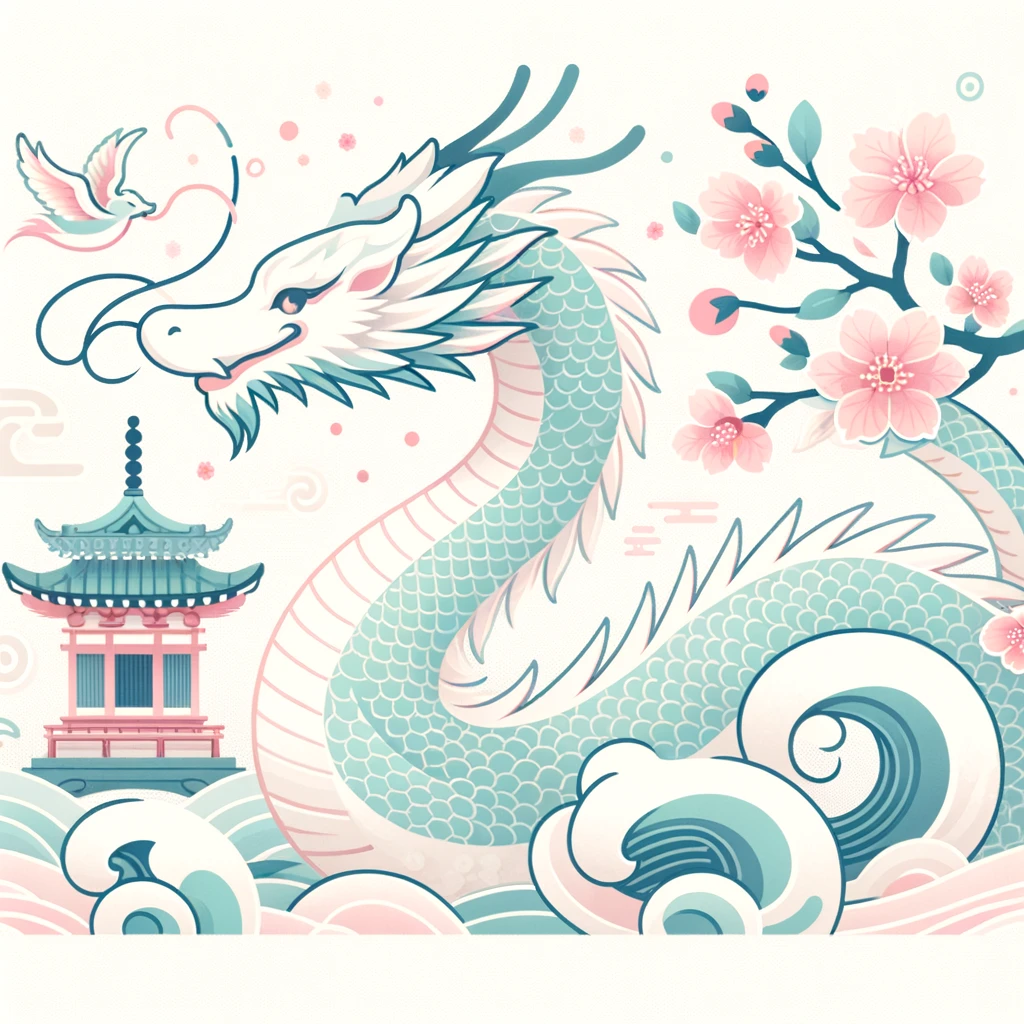英語で十二支の一つ「辰年」について紹介します。
実際の英会話例とともに、十二支と辰年について英語で解説。
十二支と辰年について触れながら、実践的な英会話スキルと関連語彙も身につけることができます。
※後ろに和訳付の英文があります。
はじめに知っておくと役立つ情報
この英会話を読む前に知っておくと良い前提知識と情報です。
- 十二支と辰年
- 十二支は、12年周期で繰り返される動物のサイクルで、アジアの伝統的な暦に基づいています。
- 辰年はその中の一つで、ドラゴン(竜)に相当します。2024年は辰年に当たります。
- 日本の文化におけるドラゴンの象徴
- ドラゴンは日本では力、知恵、幸運の象徴とされ、尊敬されています。また、水の神としても見られ、神社などでその姿が描かれることがあります。
- 年賀状の文化
- 日本では新年を祝うために年賀状を送り合う習慣があります。これは友人や家族への挨拶として、また幸運を願う意味も込められています。辰年にはドラゴンが描かれた年賀状が人気です。
- 日本の神社での清め
- 神社に入る前に、参拝者は手や口を清めるために水を使います。この習慣は精神的な清浄を象徴しており、しばしばドラゴンの形をした水鉢で行われます。
英語
2人が2024年の辰年について話しています。
ドラゴンが十二支の一つとして、どのように象徴とされ、尊敬されているか、また、年賀状や神社でのドラゴンの描写など、日本の伝統と文化におけるドラゴンの役割について話題にしています。
また、ドラゴンが持つリーダーシップや野心などの特徴についても触れています。
会話 / conversation

Key, did you know that 2024 is the Year of the Dragon according to the Japanese zodiac? It’s called ‘tatsu’ in Japanese.

Yes, I’ve heard! It’s fascinating how each year is represented by a different animal. The dragon is such a powerful and revered symbol in our culture.

Absolutely, and it’s everywhere, from nengajō cards to shrine decorations. Last year, I sent out dragon-illustrated nengajō cards to my friends. It felt like a great way to embrace this tradition.

That’s a lovely gesture, Mack. Dragons are not just mythical creatures here; they symbolize wisdom, strength, and are revered as water gods. You see them depicted in Shintō shrines, often with water flowing from their mouths.

I’ve always been intrigued by that. It’s like they’re guarding the purity and sanctity of the shrines. It really shows the deep spiritual connection the Japanese have with the dragon.

True. And being born in the Year of the Dragon, I feel a kind of personal connection. Dragons are said to be leaders, full of ambition and confidence.

It’s amazing how these zodiac animals influence our perception and beliefs. The dragon’s presence in proverbs, like ‘ryūtō dabi’, shows its impact on Japanese thought and language.

Absolutely. Living here during the Year of the Dragon has made me appreciate these cultural nuances even more!
関連情報 / related information
十二支・辰年について

Introduction to the Japanese Zodiac
The Japanese zodiac is based on a 12-year cycle, where each year is associated with an animal. This system, influenced by Chinese astrology, is deeply rooted in Japanese culture. Each animal in the cycle, including the dragon, has specific characteristics and is believed to influence the personalities and fortunes of people born in that year.
The Year of the Dragon
The Year of the Dragon, known as “Tatsu” in Japanese, is one of the most significant and powerful symbols in the zodiac. The dragon is a mythical creature that represents strength, wisdom, and good fortune. In Japan, people born in the Year of the Dragon are often considered ambitious, confident, and natural leaders.
Dragon in Japanese CultureIn
Japanese culture, the dragon is more than a zodiac sign. It is revered as a water god in religious practices, especially in Shintō, Japan’s indigenous faith. Dragons are often depicted in Japanese art and folklore, symbolizing power and benevolence. They are believed to bring rain and good harvest, making them important figures in agricultural society.
Celebrating the Dragon Year
During the Year of the Dragon, various celebrations and customs take place in Japan. Nengajō, or New Year’s cards, often feature dragon illustrations. These cards are sent to family and friends to bring good luck and prosperity for the coming year. The dragon’s imagery is also common in decorations and festivals, showcasing its cultural significance and the deep respect it commands in Japanese society.
和訳付
会話 / conversation

Key, did you know that 2024 is the Year of the Dragon according to the Japanese zodiac? It’s called ‘tatsu’ in Japanese.
キー、2024年は日本の十二支で辰年(たつどし)だって知ってた?日本語では「たつ」と言うんだよ。

Yes, I’ve heard! It’s fascinating how each year is represented by a different animal. The dragon is such a powerful and revered symbol in our culture.
うん、聞いたよ!毎年違う動物で表されるのって面白いよね。ドラゴンは、私たちの文化ではとても力強く尊敬される象徴だよ。

Absolutely, and it’s everywhere, from nengajō cards to shrine decorations. Last ye”ar, I sent out dragon-illustrated nengajō cards to my friends. It felt like a great way to embrace this tradition.
本当だね、年賀状から神社の装飾に至るまで、どこにでもあるよ。去年、友達にドラゴンのイラスト入り年賀状を送ったんだ。この伝統を受け入れる素晴らしい方法のように感じたよ。

That’s a lovely gesture, Mack. Dragons are not just mythical creatures here; they symbolize wisdom, strength, and are revered as water gods. You see them depicted in Shintō shrines, often with water flowing from their mouths.
それは素敵なジェスチャーだね、マック。ここではドラゴンは単なる神話上の生き物ではないんだ。知恵と力の象徴で、水の神として尊敬されているんだよ。神社でよく水を流している口から描かれているのを見るでしょ。

I’ve always been intrigued by that. It’s like they’re guarding the purity and sanctity of the shrines. It really shows the deep spiritual connection the Japanese have with the dragon.
それにはいつも興味を惹かれていたんだ。まるで神社の純粋さと聖性を守っているみたい。日本人がドラゴンと持つ深い精神的なつながりを本当に示しているね。

True. And being born in the Year of the Dragon, I feel a kind of personal connection. Dragons are said to be leaders, full of ambition and confidence.
本当だね。辰年生まれとして、個人的なつながりを感じるよ。ドラゴンは野心と自信に満ちたリーダーだと言われているんだ。

It’s amazing how these zodiac animals influence our perception and beliefs. The dragon’s presence in proverbs, like ‘ryūtō dabi’, shows its impact on Japanese thought and language.
これらの十二支の動物が私たちの認識と信念にどのように影響を与えているか、本当に驚くべきことだね。「竜頭蛇尾」のようなことわざにドラゴンが現れることは、日本の思考と言語に与える影響を示しているね。

Absolutely. Living here during the Year of the Dragon has made me appreciate these cultural nuances even more!
間違いないね。辰年の間ここで生活することで、これらの文化的なニュアンスをさらに感謝するようになったよ!
関連情報 / related information
十二支・辰年について

Introduction to the Japanese Zodiac
The Japanese zodiac is based on a 12-year cycle, where each year is associated with an animal. This system, influenced by Chinese astrology, is deeply rooted in Japanese culture. Each animal in the cycle, including the dragon, has specific characteristics and is believed to influence the personalities and fortunes of people born in that year.
日本の十二支の紹介
日本の十二支は、12年周期で各年が動物と関連付けられているシステムです。このシステムは中国の占星術の影響を受けており、日本文化に深く根ざしています。サイクルの中の各動物、ドラゴンも含めて、特定の特性を持ち、その年に生まれた人々の性格や運命に影響を与えると信じられています。
The Year of the Dragon
The Year of the Dragon, known as “Tatsu” in Japanese, is one of the most significant and powerful symbols in the zodiac. The dragon is a mythical creature that represents strength, wisdom, and good fortune. In Japan, people born in the Year of the Dragon are often considered ambitious, confident, and natural leaders.
辰年について
日本語で「たつ」と呼ばれる辰年は、十二支の中で最も重要で力強い象徴の一つです。ドラゴンは力、知恵、幸運を表す神話上の生き物です。日本では、辰年に生まれた人々は野心的で自信があり、生まれつきのリーダーであるとよく考えられています。
Dragon in Japanese Culture
In Japanese culture, the dragon is more than a zodiac sign. It is revered as a water god in religious practices, especially in Shintō, Japan’s indigenous faith. Dragons are often depicted in Japanese art and folklore, symbolizing power and benevolence. They are believed to bring rain and good harvest, making them important figures in agricultural society.
日本文化におけるドラゴン
日本文化において、ドラゴンは単なる十二支の一部ではありません。特に日本の固有の信仰である神道において、水の神として崇拝されています。ドラゴンは日本の芸術や民話によく描かれ、力と善意の象徴とされています。雨をもたらし、良い収穫をもたらすと信じられており、農業社会において重要な存在です。
Celebrating the Dragon Year
During the Year of the Dragon, various celebrations and customs take place in Japan. Nengajō, or New Year’s cards, often feature dragon illustrations. These cards are sent to family and friends to bring good luck and prosperity for the coming year. The dragon’s imagery is also common in decorations and festivals, showcasing its cultural significance and the deep respect it commands in Japanese society.
辰年のお祝い
辰年の間、日本では様々なお祝いや習慣が行われます。年賀状はよくドラゴンのイラストが特徴で、家族や友人に送られ、来年の幸運と繁栄を願います。ドラゴンのイメージは装飾や祭りにもよく使われ、日本社会におけるその文化的な重要性と深い尊敬を示しています。
words & phrases
英会話ダイアローグと関連情報に出てきた単語・フレーズです(例文は各3つ)。

zodiac /ˈzoʊ.di.æk/
意味: 十二宮、動物占星術。A circle of twelve 30° divisions of celestial longitude that are centered upon the ecliptic.
例文:
The Chinese zodiac is a major part of the culture in many Asian countries.
中国の十二宮占星術は、多くのアジアの国々の文化の重要な部分です。
She is interested in astrology and often reads her zodiac sign’s horoscope
彼女は占星術に興味を持っており、よく自分の星座の占いを読んでいます。
According to the zodiac, 2024 is the Year of the Dragon.
十二宮によれば、2024年は辰年です。
revered /rɪˈvɪrd/
意味: 尊敬される、崇拝される。Regarded with great respect or admiration.
例文:
The samurai are revered figures in Japanese history.
侍は日本の歴史において尊敬され
In many cultures, ancestors are revered and honored.
多くの文化では、祖先は尊敬され、敬われています。
The dragon is a revered symbol in Eastern mythology.
ドラゴンは東洋神話において尊敬される象徴です。
sanctity /ˈsæŋk.tə.ti/
意味: 神聖、聖性。The state or quality of being holy, sacred, or saintly.
例文:
The sanctity of the temple was preserved by the monks.
その寺院の聖性は僧侶によって守られていました。
Many people visit the shrine to experience its sanctity.
多くの人がその神聖さを感じるために神社を訪れます。
The sanctity of life is a fundamental principle in many religions.
生命の神聖さは多くの宗教において基本的な原則です。
associated /əˈsoʊ.si.eɪ.tɪd/
意味: 関連した、結びついた。Connected or linked with something.
例文:
Each color is associated with a different mood.
それぞれの色は異なる気分と関連付けられています。
The symptoms are associated with the disease.
これらの症状はその病気と関連しています。
He is associated with the new project.
彼は新しいプロジェクトに関連しています。
astrology /əˈstrɒl.ə.dʒi/
意味: 占星術。The study of the movements and positions of the sun, moon, planets, and stars in the belief that they affect the character and lives of people.
例文:
Many people read their astrology horoscopes daily.
多くの人が毎日自分の星座占いを読んでいます。
Astrology has been a part of human culture for thousands of years.
占星術は何千年もの間、人間の文化の一部でした。
She believes astrology can reveal a lot about a person’s personality.
彼女は占星術が人の性格について多くを明らかにできると信じています。
ambitious /æmˈbɪʃ.əs/
意味: 野心的な。Having or showing a strong desire and determination to succeed.
例文:
He is an ambitious young entrepreneur.
彼は野心的な若い起業家です。
The project was ambitious but ultimately successful.
そのプロジェクトは野心的だったが、最終的には成功した。
She has ambitious plans for her business.
彼女は自分のビジネスに対して野心的な計画を持っています。
indigenous /ɪnˈdɪdʒ.ə.nəs/
意味: 固有の、先住の。Originating or occurring naturally in a particular place; native.
例文:
The forest is home to many indigenous species.
その森は多くの固有種の家で
They are fighting for the rights of the indigenous people.
彼らは先住民の権利のために戦っています。
Indigenous cultures have a deep connection to the land.
固有の文化は土地と深いつながりを持っています。
folklore /ˈfoʊk.lɔːr/
意味: 民間伝承。The traditional beliefs, customs, and stories of a community, passed through the generations by word of mouth.
例文:
The legend of the dragon is an important part of local folklore.
ドラゴンの伝説は地元の民間伝承の重要な部分です。
Folklore often explains the origins of natural phenomena.
民間伝承はしばしば自然現象の起源を説明します。
She loves studying the folklore of different cultures.
彼女は異なる文化の民間伝承を研究することが好きです。
benevolence /bəˈnev.ə.ləns/
意味: 善意、慈悲。The quality of being well-meaning; kindness.
例文:
The king was known for his benevolence towards his subjects.
その王は臣民に対する慈悲で知られていました。
Her benevolence has made a difference in many lives.
彼女の善意は多くの人々の人生に影響を与えました。
The charity organization is known for its benevolence.
その慈善団体はその慈悲で知られています。
imagery /ˈɪm.ə.dʒər.i/
意味: 映像、画像。Visually descriptive or figurative language, especially in a literary work.
例文:
The poem is rich in imagery.
その詩は豊かな映像を持っています。
She uses powerful imagery in her speeches.
彼女はスピーチで力強い映像を使います。
The artist is known for his unique imagery.
そのアーティストは独特な画像で知られています。
command /kəˈmænd/
意味: 命令する、支配する。To give an authoritative order; to have control or authority over something.
例文:
The general commanded his troops effectively.
その将軍は効果的に彼の部隊を指揮しました。
She commands a high salary due to her skills.
彼女のスキルのために、彼女は高い給料を支配しています。
The painting commands the viewer’s attention.
絵画は視聴者の注意を命じます。
